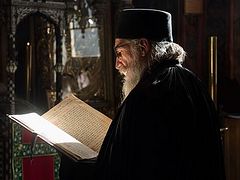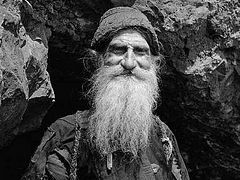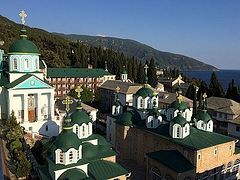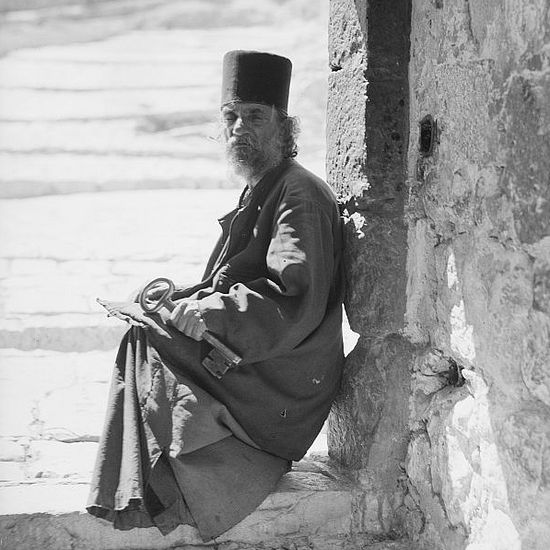 The key-master of the Monastery of St. Savvas the Sanctified
The key-master of the Monastery of St. Savvas the Sanctified
Here it should be recalled that for most of his life, Fr. Barnabas did not have a corner of his own to live in, but he spent a long time in the kallyvia in Katounakia, where the famous hesychast Fr. Gerasim lived, who labored for three years in search of silence on the summit of the so-called Little Athos (Mt. Carmel), and Elder Barnabas was his disciple.
They say that Fr. Barnabas had a disciple named Joasaph; once, on the eve of Great Lent, it happened that they still had a sack of flour left in the kallyvia, and he said to his disciple Joasaph, “Take this sack, go down to the rocks, and throw it away, because Great Lent is starting, and we don’t need it anymore.”
The disciple obeyed the elder’s command, took the sack of flour, walked to the rocks, cut it open with a knife and scattered the flour on the rocks.
Many considered this act foolish and said he should have given this sack to other, poor monks, if he himself wasn’t planning to use it in his community. But others judiciously said, “We can’t judge and weigh the deeds and actions of the elders, so great and successful in virtue, because only those who have attained the height of virtue and holiness, such as this hermit and ascetic Barnabas the Elder, are able to understand the essence and meaning of this virtue. After all, in the Evergetinos we read about an elder who wove baskets and sacks out of twigs, and then threw them in the river, so not a trace could be found.
Perhaps he did it, like many such acts, with a specific purpose, because the news spread that he was a successful monk who had attained to spiritual knowledge. Therefore, being a worker of noetic prayer, he did absurd and frenzied things for the sake of appearances, so he would be judged as reckless, devoid of virtue and holiness, and so this rumor would spread.
However, whoever examines a certain letter of Elder Barnabas, will understand and be assured that this blessed hermit avoided praise at all costs out of humility, according to the word of the Gospel: Let not thy left hand know what thy right hand doeth (Mt. 6:3).
The elder’s blessed repose
Towards the end of his life, this blessed hermit wanted to visit the Holy Land. He visited the cenobitic Monastery of Savvas the Sanctified there and stayed there for quite a long time, leading as ascetic a life as possible, abstinent and austere in many things, and he started telling the brothers about noetic prayer. Some of them, weak in understanding, considered him to be deluded, defamed him before the Patriarch, who without conducting an investigation, ordered him to be imprisoned in the monastery tower as one deluded.
Locking him in the tower, the Patriarch forbade the monks to communicate with him, so they wouldn’t be harmed and led into delusion by his wrong teachings (what doesn’t ignorance in the spiritual life lead to?!).
Then one Athonite spiritual father, Fr. Minas, came to Jerusalem on pilgrimage. The patriarch asked if he knew Fr. Barnabas and if he had many disciples on the Holy Mountain. When he was informed by Fr. Minas that Elder Barnabas had very many disciples on the Holy Mountain, he was very grieved and told this spiritual father to inform all the Athonite monks to keep away from the teachings of Barnabas and not to listen to his counsels, for he is in delusion.
Blessed Barnabas learned from the monastery brothers of the Patriarch’s detrimental deeds and commandments, and asked the brother who brought him food to tell the Patriarch that he was fervently asking him to deign to come to him, because he had something very important to report and wanted to talk to him personally and very urgently.
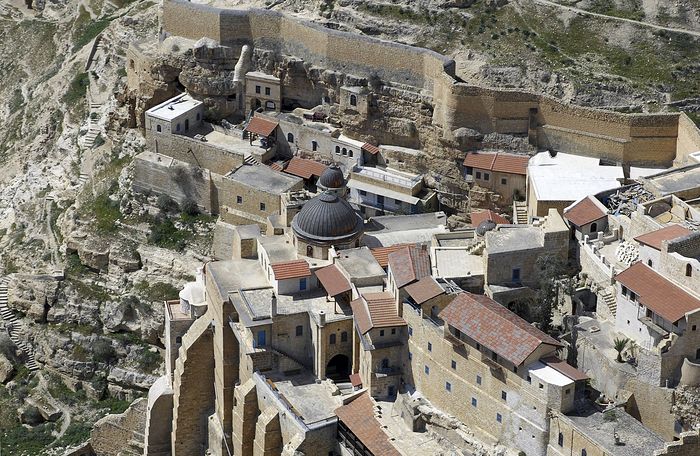 The Lavra of St. Savvas the Sanctified
The Lavra of St. Savvas the Sanctified
The Patriarch, probably out of curiosity, allowed himself to be persuaded and went to the tower of St. Savvas Monastery to look at Elder Barnabas and listen to him. No one knows what the blessed elder said or revealed to the Patriarch, but everyone knows that after this conversation with the Patriarch there was such a change that he, ashamed, left the tower and shouted with all his might for all to be heard:
“Let this man out, for he is holy and chosen of God! He is His honorable vessel. This world stands to this day and has not yet been destroyed because of the prayers and intercession of such holy people.”
When the fathers brought Elder Barnabas out of the tower, he wanted to remain in the Monastery of St. Savvas until the end of his days, where he was vouchsafed a righteous death.
All of this was brought to our attention by one spiritually successful father who personally assured us that, as testimony to the virtuous life of Blessed Barnabas, his remains emitted an ineffable fragrance, to the glory of God the Father, the Son, and the Holy Spirit.1
1 From the book, Patericon of the Holy Mountain by Monk Andrew the Athonite (Monahul Andrei Aghioritul. Patericul Sfântului Munte. Editura Sophia, 2013, p. 219–233).

